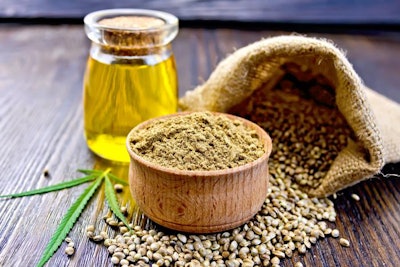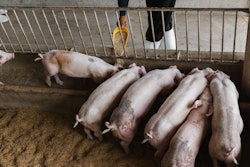
Coalition seeks approval for hemp seed meal in feed for laying hens with first application to FDA
Laying hens may be the first livestock to enjoy hemp animal feed if the U.S. Food and Drug Administration (FDA) approves a new application by the Hemp Feed Coalition.
The coalition announced on February 4 that it has filed an application to FDA for recognition of hemp seed meal and hemp seed cake as a safe and nutritious feed ingredient for laying hens. Selling the eggs from chickens fed hemp will require additional approvals. Hunter Buffington, executive director of the Hemp Feed Coalition, said the application represents an important first step in making hemp byproducts available for use in animal feed.
Buffington said the application represents the culmination of two years of intensive research that ultimately demonstrated hemp seed meal is not only safe for laying hens to consume, but also contains a consistent nutritional profile comprised of 30% protein and 10% fats. The meal’s desirable omega-3 content, Buffington said, could lend itself to use in the production of eggs marketed for their specialized nutritional value once key questions about whether the trace amounts of cannabinoids bioaccumulate when hemp is fed to animals.
Researchers look for answers
Early research from Kansas State University has found that when fed hemp flowers, selected to represent a sort of worst-case scenario on account of their high cannabinoid content, cattle stored the plants’ active chemical compounds in tissues for days at time. It’s still not clear whether other hemp components that contain fewer cannabinoids will have the same effect, potentially preventing animal products from being sold to consumers, Buffington said. Researchers have also begun to explore whether “cleansing periods” would eliminate the cannabinoids from the animals’ systems, allowing animals fed hemp to be sold for human consumption.
These are important questions to answer, Buffington said, not just because hemp contains attractive nutritional properties such as omega-3, but also because the growing hemp industry in the U.S. has ample byproducts available for use as animal feed. Hemp seed meal, she said, is a byproduct of crushing hemp seeds for oil, which is increasingly popular for human consumption and desirable in equine and dog food products, although the use of hemp oil in any product intended for animal consumption is prohibited.
“There is a lot of this material across the country,” Buffington said, “and as we begin to really scale up the hemp industry, there’s going to be more.”
Although hemp seed meal offers some unique potential benefits to egg producers, Buffington said the Hemp Feed Coalition started with layers of the sake of practicality: obtaining the necessary study data is simpler in a species with a shorter lifespan, smaller size, and that’s generally cheaper. The coalition is seeking funding for additional studies in cattle and horses.
“We’re excited, but this is the first one. So, as amazing as it is, we have some more work to do,” Buffington said.














